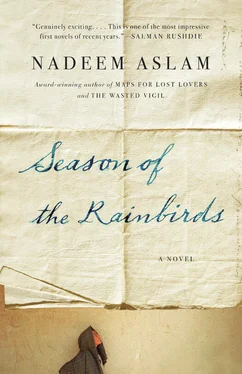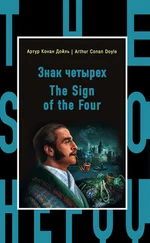Yusuf Rao’s wife brought in the coffee. Her hair was wet and hung limply on either side of her face, each strand ending in a large drop of water. She smelled of clean water. ‘You should stay for lunch, brother-ji,’ she said to Mr Kasmi. ‘But it will be late. It’s Friday so I had to have a bath.’ She handed them their cups. ‘I don’t know how you can drink this. It smells of chick-pea sauce that’s been left on the stove for too long.’
Mr Kasmi said, ‘You may be right, sister-ji. Coffee is a kind of roasted bean.’
Yusuf Rao said noisily, ‘I drink it because it reminds me of my student days.’ He winked at his wife.
‘You have no shame, Yusuf Rao,’ the woman said, smiling. And she turned to Mr Kasmi: ‘Your friend has no shame, brother-ji.’
Yusuf Rao sipped the drink. He said, ‘Your brother-ji was just telling me that they’re planning a bigger police station for this town. More men and a bigger building, perhaps a promotion for the inspector. I think that’s proof enough that something did happen on Wednesday night.’
The woman sought Mr Kasmi’s eyes. He nodded.
‘The sooner we get rid of this evil general, the better,’ she said. She turned to Yusuf Rao and said: ‘When the government changes I’m going to make a list of all the things you once did for the opposition and I’m going to get you a ministership.’
‘I’ve given up all that.’
There was bitter resentment in the woman’s voice. ‘They accused our party of electoral fraud. But in this town it was Mujeeb Ali who rigged the ballots.’
‘Nation-wide it was us,’ Yusuf Rao said. ‘And that’s what counts. Everyone cheats, so the one who cheats the most is the cheater. But why dig it all up again? As I said, I gave up on all that years ago. I don’t want to be a minister, bibi. The boys will be grown up in a few years. They’ll start earning.’
‘They’ll disappoint me yet.’ The woman went to the door. ‘Fridays drive me insane. Children are home, husband is home and, on top of that, there’s this noise from the mosques.’
‘What did the poor husband do?’ Yusuf Rao shouted after her.
By three o’clock, when they sat down to eat, the prayers had been said at both mosques. Maulana Dawood had finished his sermon; Maulana Hafeez was just beginning his.
There was bésan stew with dumplings, tur salad — almost out of season now — and iced lemon water. Dessert would be pistachio halva which everyone knew smelled better than it tasted. Yusuf Rao’s wife and eldest daughter — the pair had said their prayers — laid the table. One of the boys was attempting from memory Charlie Chaplin’s bread-roll dance with two spoons; the children had seen the film from which the sequence came on the television the night before. The eldest girl began to make chappatis. Her mother served the food.
Maulana Hafeez’s voice carried through the streets. And what if the entire world has wandered down the wrong path? We must still fight to keep ourselves pure. Remember that the darkness which has the ability to overpower a mountain is beaten by the tiniest of flames .
They ate in silence. The peepul-leaf whistle, clogged now with saliva, was next to the little girl’s plate. Yusuf Rao’s wife took away the stew dish and returned with it filled to the brim leaving a trail of steam behind her. She was listening to Maulana Hafeez without blinking.
The cleric was easing into his sermon. We have forgotten what lies in store for sinners. Aflame that is a thousand times more poisonous than any fire of this earth .
The twelve-year-old spent his time at the table pulling down his sleeve to cover a shoe-polish stain on his wrist. The little girl knocked over a glass of water.
Maulana Hafeez spoke for another ten minutes, his voice rising as, for the first time, he openly condemned the deputy commissioner and his mistress. Ties of family, friendship and faith keep us united against the attentions of Shaitan .
One by one the children left the table; no one managed to finish dessert. Mr Kasmi pressed his handkerchief to his lips. Yusuf Rao belched. The girl shouted from the kitchen to know how many chappatis were left. She slid the baking-iron under the shelf. Mother and daughter cleared the table, wiped down the surface and sat down to eat. Beads of sweat glistened on the girl’s brow.
It was many minutes before anyone spoke.
‘It seems that Maulana Hafeez is turning into a Maulana Dawood,’ Yusuf Rao said.
‘Maulana-ji is right,’ his wife said. ‘Somebody had to speak out. Those two are behaving like pigs. Now they’ll have to take notice and do the decent thing.’ Her breathing was laboured but her tone was measured, careful not to embarrass the girl in front of her father or make the father uncomfortable by being open with him in front of the daughter; and, of course, there was Mr Kasmi.
The heavy meal and the heat were combining to induce a stupor. Yusuf Rao fingered the collar of his shirt, and said, ‘He didn’t have to mention them by name though.’
Mr Kasmi took a breath. ‘What difference does that make? Everyone would have known who was being referred to anyway.’

Gul-kalam’s family had gone back to their village in the mountains. Their house — the lubinium just coming into leaf — stood locked. They had taken the morning bus out of town. The compact little group had been ignored by everyone who passed by the bus station. Kalsum and Suraya watched them through the window as they came down the back lane and turned the corner — the women with jewels in the ridge between their nostrils, the half-asleep children and the wide-awake babies, the crippled brother, the goats, the heavy trunks and bundles. Suraya had said, closing the window, ‘There was no need for them to leave.’
Now Kalsum and Suraya sat on the veranda. There was no wind, hardly a breeze. Leaves whispered on the arbour.
‘What did Yusuf Rao say when you went to see him yesterday?’ Kalsum asked.
‘He says if Burkat wants me to divorce him then I should keep the house,’ Suraya said.
‘And put him out?’
‘Yes.’
Kalsum lifted an eyebrow. ‘Where would he go?’
‘What do I care!’
‘For shame!’ Kalsum touched her earlobes. ‘Such talk from a Muslim. He’s your husband … And what about the boy?’
Suraya’s eyes softened. ‘He says I have a right to him as well.’ Her face had lit up at the mention of her son. ‘He’s tall, apa. Two hands taller than his father. Only fourteen years old.’ Good food and a healthy environment had unlocked the information in the boy’s genes; information that had been dormant in his father and uncles.
‘So,’ Kalsum said, ‘you’ve decided to go back.’
Suraya did not reply. Instead, she said: ‘You’d be alone here if I go, apa. Once again.’
Kalsum folded her arms. ‘Don’t worry about me. I’m happy where my men have left me.’

The sunlight yellowed, turned amber and then faded.
The barber locked the door to his shop and jumped down from the platform. He and Zafri walked together towards their homes. They lived in the same lane by the western river. They kept silent as they passed Judge Anwar’s house. A cat jumped down from a tree and crossed their path.
Inside Judge Anwar’s house the youngest girl took the chewed toffee out of her mouth to see what colour it had become. One of her sisters — her eyes swollen from ten days of tears — rebuked her. The child scuttled out of the room, blowing bubbles with the warm saliva thick with caramel. The widow listened to a noise for some minutes before realising that it was the sound of her own breathing. There was a flash of lightning. The widow smiled acquiescently at the child who had just come into the room and said: ‘God’s taking a picture.’
Читать дальше













